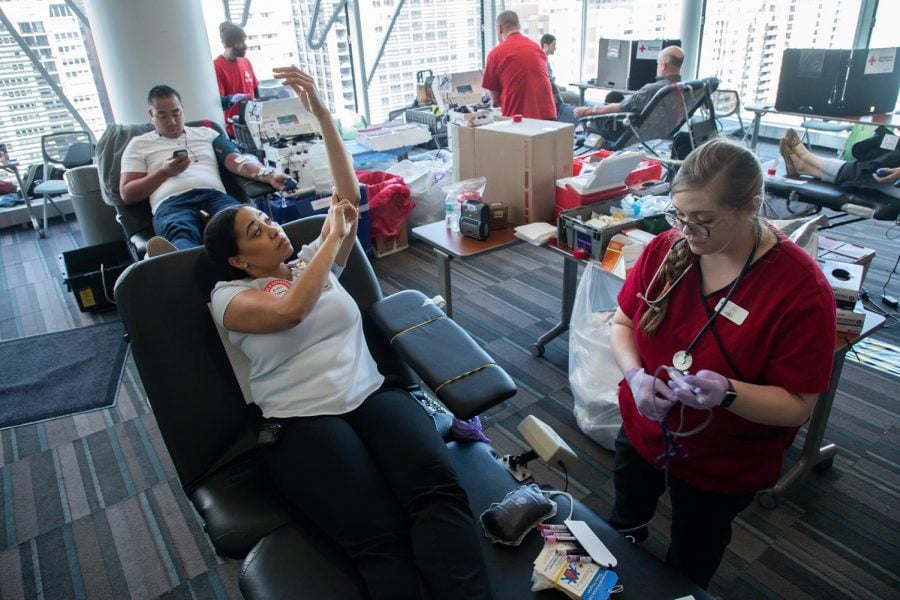Blood banks stabilize supply, prepare to collect COVID-19 plasma
Zbigniew Bzdak/Chicago Tribune/TNS
A Red Cross blood drive at Lurie Children’s Hospital in Chicago. Amid the pandemic, blood service provider Vitalant canceled 95 percent of their community blood drives.
April 23, 2020
When the COVID-19 outbreak first hit Evanston, local blood banks were anticipating a serious blood supply crisis. Now, blood banks have not only stabilized blood supply, but are providing plasma to help treat COVID-19 patients.
Blood service provider Vitalant is collecting blood plasma from residents who have recovered from COVID-19. Known as convalescent plasma, the blood product contains antibodies which can help fight active COVID-19 cases.
Adults over the age of 16, with a prior diagnosis of COVID-19 and a complete resolution of symptoms for at least 28 days, are eligible to donate convalescent plasma, according to a statement.
“Convalescent plasma is currently the only antibody treatment available to COVID-19 patients and as such, is a promising new tool,” said Mona Papari, senior chief medical officer for Vitalant-Illinois. “Because of its potential, the FDA, along with hospitals and blood centers such as Vitalant, have quickly responded with a program which combines the strength of each organization with the altruism of the recovered donors to assist critically ill patients,”
Just a few weeks ago, Vitalant had to cancel 95 percent of its mobile blood drives in the Illinois area, amounting to about 1000 units of blood lost per week. Most of the blood Vitalant collects comes from blood drives, according to Holly Seese, Vitalant marketing and communications lead.
At NorthShore Evanston Hospital Blood Bank, employee Ronnelle Herring said residents were canceling blood donation appointments out of fear. Walk-ins are also no longer permitted, which had a serious impact on the blood bank.
Both Vitalant and Northshore have since stabilized their blood supply. Herring said Evanston residents have been turning up in large quantities to give blood.
“Word of mouth (regarding the need for blood donations) travels pretty fast…people found a way to get past that fear again and came out in large quantities to just donate anyway,” said Herring.
Blood donation sites have implemented several precautions to protect healthcare workers and donors from COVID-19. Herring said NorthShore employees are mandated to participate in screenings in the morning and every time they exit or enter the hospital. The hospital has also cut back on staff.
Herring said NorthShore started a study last week around convalescent plasma.
Seese emphasized the uncertainty of running a blood bank amid COVID-19. Vitalant cannot predict the quantities of blood that will be donated from week to week. If residents effectively stop turning out to donate, Seese said Vitalant could face a crisis within as soon as a week.
“We’re making up that blood volume…a week from today, that could all change,” Seese said. “People that have worked in the blood industry for 30 to 40 years have never seen anything close to this situation.”
Email: [email protected]
Twitter: @snehadey_
Related stories:
— NorthShore University HealthSystem postpones all non-emergency surgeries
— NorthShore University HealthSystem to screen all visitors for COVID-19 risk factors
— NorthShore University HealthSystem treating one patient for novel coronavirus


